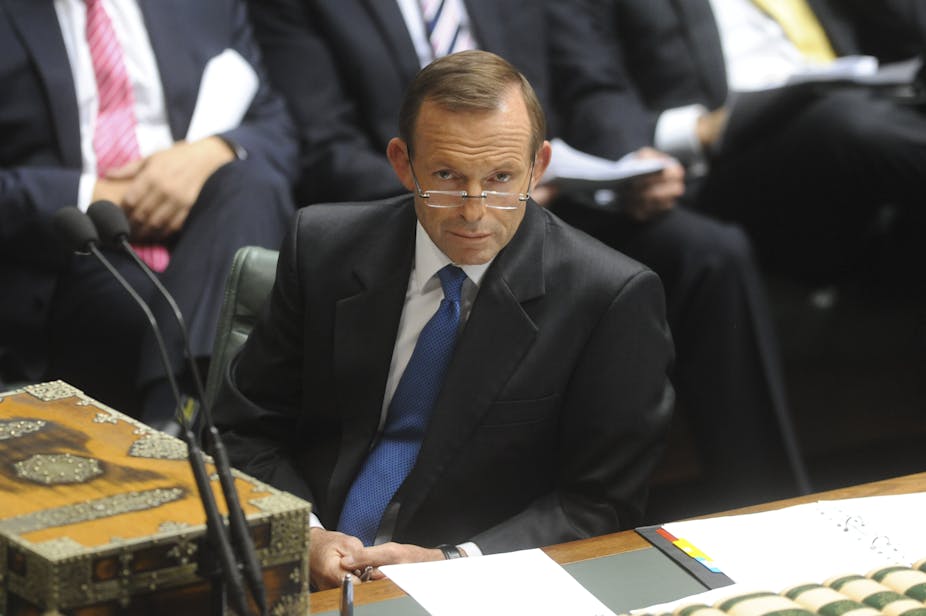It was an extraordinary moment. Tony Abbott, overcome with emotion, as he paid a tribute to Martin Ferguson, after Labor’s former resources minister announced he would leave parliament at the election.
Just as strange as Julia Gillard in tears recently when she introduced the bill to increase the Medicare levy to help fund the national disability scheme.
No one doubts the sincerity of Abbott’s regard for Ferguson, nor the genuineness of the PM’s commitment to the disability plan.
But some also see these moments as revealing the extreme pressure these leaders – like many others in the political fray – are under as this parliament grinds towards its end. Nerves are stretched beyond breaking point; exhaustion is rife.
While the overall pendulum has tilted so far towards the Coalition that most observers take its victory in September for granted, at an hour-to-hour level fortunes swing.
On one of the big issues of the week (others were allegations of Chinese hacking and claims of inadequate funding for intelligence agencies), Labor came under huge criticism for its attempt to hand out tens of millions of dollars to the political parties for their administration.
But when Abbott went back on the deal the opposition had done to support the legislation – the only thing he could do, given the reaction within the Coalition and the community – his credibility took a blow. Suddenly Labor had a stick to beat him with, and the commentators had questions to raise.
How would he respond in government on his earlier promises, when the heat was applied to his feet? Would there be core and non-core pledges?
“In the end, democratic political leaders have got to be conscious of the mood of the public”, Abbott said yesterday, explaining himself.
In power, would he be willing to be flexible in response to “the mood of the public”? No doubt critics within his own ranks, who would like him to alter some policies, such as his generous paid parental leave scheme, will wonder if such a somersault gives hope for their future influence on him.
Politicians make lots of promises, big and small and inevitably a number get broken or compromised. Abbott, if he becomes PM, will be saddled with some very large promises - most obviously repeal of the carbon tax when it is already embedded and, if that were blocked in the Senate, his undertaking to have a double dissolution. What if the public were groaning at the prospect of another election? Would their “mood” come into consideration?
More immediately, now that the dollar handout for the parties has been sunk, the government is expected to return to the disclosure legislation it already has in the Senate.
On Wednesday night’s ABC Lateline Special Minister of State Mark Dreyfus flagged that if the coalition broke its commitment and the government didn’t proceed with the legislation, “we will be looking very closely at the bill that passed through the House of Representatives in 2010”.
That bill is much tougher on disclosure than the aborted one. It brings down the level at which donations must be made public from more than $12,000 at present (which is indexed) to a flat $1000, and provides for the aggregation of donations so donors can’t evade disclosure by splitting money between various parts of a party. It would also crack down on anonymous donations.
The government would have to negotiate with the crossbenchers in both houses which could mean some changes.
The Senate numbers are there to pass this legislation, assuming Greens backed it. The Greens yesterday were talking about ambitious amendments but you would think they would prefer this bill to nothing.
The bill (which gives no extra funds to parties) would have to go back to the House of Representatives because it requires some technical alteration. But as it has passed there once it should be able to get through again with crossbench support.
It does not go as far on funding reform as it could – for example, critics of the present system would like to see caps on union and corporate donations (which should have been a trade off for any move to give money for party “administration” but was not being proposed). But it definitely would be a step forward.
(A glance at the agenda for this weekend’s Nationals Federal Council meeting in Canberra is a timely reminder of the place of big donors in the political system. Climate sceptic professor Ian Plimer delivers what’s billed as “Major Sponsor’s Address”. The sponsor referred to is Gina Rinehart’s Queensland Coal Investments company. Then there is CropLife Australia Leaders’ Luncheon followed by the Manildra Group Gala Dinner.)
One of the most trenchant critics of the government’s funding handout legislation this week was Labor senator John Faulkner who told caucus it made him “ashamed”. Faulkner as special minister of state in the Rudd government set the ball rolling on donations’ reform. Only Faulkner and Daryl Melham, chairman of the parliamentary committee on electoral matters, spoke out in opposition at Tuesday’s meeting of the full caucus.
Faulkner and Melham would both be delighted to see the passage of the 2010 bill. It is legislation that has been opposed by the Coalition and would be again, but if it happened to be passed in coming weeks, it would be courtesy of Abbott breaking his word on the other bill. Politics can move in the strangest ways.

